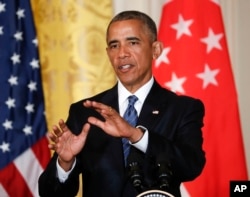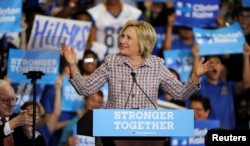U.S. President Barack Obama wants Congress to approve the 12-nation Trans-Pacific Partnership trade deal his administration has been negotiating for nearly his entire time in office. The major candidates to replace him in January would rather not see that happen.
"Right now, I'm president and I'm for it," Obama said Tuesday during a joint news conference with the prime minister of Singapore.
Obama made the case that the TPP would lower tariffs on U.S. goods while also making markets more fair for the country's workers by forcing other nations to abide by stricter labor and environmental standards.
"What I also think is important is for people to recognize that the alternative is not TPP or some imaginary circumstance in which suddenly we're able to sell goods around the world wherever we want," he said. "The alternative is what we have today" a situation in which we don't have as many protections around labor and environmental issues as we’d like; a situation in which there are countries like Japan that sell a lot of goods here, but that keep pretty restricted access for U.S. companies and U.S. workers to their markets."
Republican candidate Donald Trump has been outspoken against the TPP and other trade agreements, vowing that he would renegotiate existing deals to make sure they benefit U.S. workers.
He said last month during an address at the Republican National Convention the TPP would "make America subject to the rulings of foreign governments" and destroy the country's manufacturing sector.
"I pledge to never sign any trade agreement that hurts our workers or that diminishes our freedom and independence," he said. "Instead, I will make individual deals with individual countries."
Trump said no one reads or understands massive international trade pacts.
A lengthy tome
The TPP runs more than 8,400 pages. The Obama administration says the agreement's goal is to boost U.S. economic growth and create "high-quality American jobs" by increasing exports.
Democratic candidate Hillary Clinton said during her tenure as Obama's secretary of state that the TPP "sets the gold standard in trade agreements."
But that comment came before the pact was finalized last year, well after she left the administration. Clinton now opposes the deal, saying that she would want to be able to tell middle-class workers it would raise their wages. She has concluded she could not.
"We have to trade with the rest of the world," Clinton said during a debate in February. "We are 5 percent of the world's population. We have to trade with the other 95 percent. And trade has to be reciprocal. That's the way the global economy works. But we have failed to provide the basic safety net support that American workers need in order to be able to compete and win in the global economy."
The platforms adopted by the Democratic and Republican parties at their July conventions also show opposition to the TPP. Democrats said that too many past deals "have not lived up to the hype" and that the agreements often help large corporations while failing to protect workers' rights. Republicans, without specifically mentioning the TPP, warned against the passage of a significant trade deal by members of Congress who are about to leave office.
Other opposition
Green Party candidate Jill Stein has had even sharper words opposing the TPP, saying the U.S. needs trade policies that benefit everyone.
"Anyone who supports the TPP should be taken to court and accused of treason," she wrote on Twitter. "The TPP is dismantling the framework of democracy."
Libertarian candidate Gary Johnson, who has been running third in polls, said he is skeptical about these types of deals, but that based on what he's heard from advisors the TPP would advance free trade and thus he would sign it.
"The devil is in the details, though," he told CNN.
Obama said Tuesday that he understands the concerns about workers and wages in the United States, but that he believes in the agreement.
"Hopefully, after the election is over and the dust settles, there will be more attention to the actual facts behind the deal and it won’t just be a political symbol or a political football," the president said. "And I will actually sit down with people on both sides, on the right and on the left. I’ll sit down publicly with them and we’ll go through the whole provisions. I would enjoy that, because there’s a lot of misinformation."


